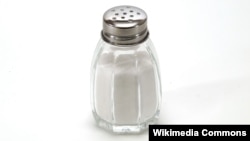The U.S. Food and Drug Administration would like to see food-processing companies and restaurants reduce the amount of salt in their food by one-third over the next 10 years.
The draft guidelines issued Wednesday are voluntary, but the FDA hopes that reducing the sodium in Americans' meals will help fight high blood pressure, or hypertension, which is estimated to kill 1,000 people every day in the U.S.
“The link between sodium consumption and blood pressure is strong and well documented," FDA's official blog said. ”High blood pressure is a key risk factor for heart disease and stroke. There is strong agreement among expert bodies such as the Institute of Medicine on the need to reduce consumption to less than 2,300 milligrams per day [mg/day].”
The average American currently consumes 3,400 milligrams of sodium each day.
The problem is not so much with the salt people sprinkle on their food, but rather the excessive sodium that is pre-loaded in food by manufacturers.
One of the most respected American public-health experts, Dr. Thomas Frieden of the government's Centers for Disease Control and Prevention, endorsed limits on sodium intake in an online editorial published Wednesday by JAMA, The Journal of the American Medical Association.
Frieden said a 12 percent reduction in dietary sodium could prevent 32,000 heart attacks and 20,000 strokes every year.
“Many Americans want to reduce sodium in their diets, but that’s hard to do when much of it is in everyday products we buy in stores and restaurants,” said Sylvia Burwell, head of the U.S. Department of Health and Human Development. "Today’s announcement is about putting power back in the hands of consumers, so that they can better control how much salt is in the food they eat and improve their health.”
Some scientists, however, argue the science on the link between high sodium intake and heart disease is not clear.
"The science is uncertain," Steven Nissen, chairman of cardiovascular medicine at the Cleveland Clinic said in an interview with the USA Today newspaper. "If you're in the general population, I can't support the widespread recommendation to reduce sodium intake without better science."
A senior official at the FDA, Susan Mayne, said the policy planners' recommendation was cautious.
"We know," she wrote in the FDA blog, "that sodium has important functions in many foods, such as taste, texture, and microbial safety, and it simply can’t be removed without careful consideration of those factors."





